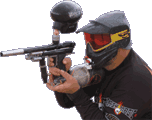  |
|
|
|
|
|
|
  |
|
|
|
|
|
|

What do you think? Add your comments in WARPIG's Forums
|

HotSeat Interview by Bill Mills WARPIG file photos by Dawn Mills It's impossible to have "been around" in paintball and not know the name Debra Dion Krishke. From promoting the company which founded the sport to producing one of the world's longest running annual tournaments, Krishke has had significant impact on both the sport and industry of paintball. After a few-year hiatus, Debra is back at the helm of a national level paintball event combining competition, scenario gaming and an industry conference and trade show. Debra took some time out of her busy schedule to talk with us about her history in the game and what new things she has in store. WARPIG: To many, your name is tied to paintball, but turning back the clock to
the pre-paintball era, what were you doing? Debra: After graduating from FSU I went over to Iran for two years with Grumman
Aerospace. Upon returning, which was a year before the revolution ( circa
1978) I opened a restaurant in New Hampshire. That's where I met the
founders of the industry - Charles Gaines and Bob Gurnsey.  Paintball Industry Legends: Left to right: Tom Kaye - AGD - Designer of the Automag Debra Krishke - Producer of the Amateur Open Bob Gurnsey - NSG - Inventor of the game Jessica Sparks - APG - Magazine editor and lobbyist Bob McGuire - APL - insurer of the sport Bud Orr - WGP - Designer of the Autococker WARPIG: You were involved in the paintball industry before anyone even called it an industry. National Survival Game was the first distributor of paintball products for the sport and had the first paintball field franchise program. How did you get involved in NSG and what was your role there? Debra : The men who started NSG became regulars at my restaurant and asked me to play. I loved the game from the first time I played and started playing almost every weekend. Several months later they asked me to represent the game on the Phil Donahue show ( the precursor to Oprah for those kids reading this:) so I started traveling and repping the game on local talk shows around the country. I was hired as the PR Director and quickly also took over the structuring of their regional/national competition. We were growing so fast we all wore a lot of hats. Mine included regional meetings, monthly newsletters, media, and the National Championships. It was a wild time! Paint that was indelible. Goggles that weren't designed for this game. Markers that weren't designed to shoot people. No chronographs. Rules we had to design through trial and error. Lawsuits up the wazoo. New markers that WERE designed for paintball but had a lot of issues. It was a rough, rocky road. Pretty amazing this game ever made it to become an industry!! WARPIG: By 1990, you'd seen that there was a need for class separation in paintball tournaments, with "pro" teams just obliterating less experienced teams because all tournaments were what we'd now call "open class" - something that we almost never see anymore. What was the tipping point that made you decide to produce the National Amateur Open. Debra:
I thought we needed a place for the broader segment of the market to come
out and play and enjoy a real gathering of paintball aficionados. All our
focus as an industry was being poured into the top 1% of the marketplace. It
just made sense to me to create something that would appeal to the broader
base of recreational players. But pretty much everyone thought I'd fail. Bud
Orr was one of the first to support my efforts. The big issue was how would
I qualify players? We set up the rules and did the best we could but we
know some folks beat the system. When I found out during one of the events
Debra: My husband Ryan and a couple of friends started Three Rivers Paintball as just a money generating hobby back in 1982. They were one of the first NSG fields in the country. I always accused him of marrying me so I could run his second business for him:) Over the years we've both run the field operations, sometimes with him at the helm, sometimes with me, and sometimes both of us. During the IAO years we'd both be in the saddle for months leading up to it. Now our daughter is running the operation and doing a fabulous job! She's certainly grown up with it! WARPIG: It seems you have always had a vision for the paintball industry that other tournament promoters have lacked. While other events have focused strictly on the paintball competition, the International Amateur Open was much more, with a huge trade show (at a time when few tournaments had more than a factory tech booth or two), player's party and industry conferences including classes on business development for field and store owners, and even motivational speakers. What impact did you see these activities have on the growing sport and industry? Debra: I'd like to think we had such a successful run because we stayed "Customer" focused. Our slogan"Unforgettable Memories are the Most Enduring Trophies of All" wasn't just a tag line but truly one of the underlying values that drove the event. We wanted to create an experience that attendees would talk about all year long. In an industry that was political and competitive we tried to create "Switzerland" where we could all come together and celebrate what united us - not what divided us. In the early years, when manufacturers were into their own product line, and everyone was just trying to grow the sport , there wasn't the animosity that developed down the road. Once the PSP and NPPL divided the industry - it was a critical blow not just to the IAO but to the entire industry . We were too small an industry to split up. There just weren't enough resources to exhaust them in so many different directions. And outside industry companies weren't being brought in to share the load. Now with the economy tightening up recreational dollars, it's more imperative than ever that we stick together for the betterment of the sport.
 Richmond Italia, then president of Diablo Paintball, announces the company's sponsorship of the 2011 IAO at a press conference with Debra and Ryan Krishke. Debra: We knew we could do a really good job of branding so it made sense for us to
offer that title position to a paintball manufacturer who stood the most to
gain. We came under a lot of attack by mandating the paint being used at our
event, but it made perfect business sense and we had an excellent marriage
with Zap for over a decade. Our customers ultimately benefited from
attending a well organized, well produced, successful event. We could afford
to have amenities that the players loved. Right down to the banners and
signage - we represented our sport and our sponsors well. That's probably
why they stuck with us for years. I'd go to other events that honestly
looked like pig styes. There was no accountability. Players tents were knee
deep in trash, no event signage. Truly an embarrassment to our sport, the
players, the media, and the sponsors. We had rules that sponsors
appreciated. Mess with one of our hotels, you were ousted from the event.
Our sponsors worked with us to offer all kinds of benefits to the players
and they are what made the IAO an amazing experience for many.  Debra Krishke at the International Amateur Open Industry Conference Debra: It's what is really at the heart of this sport. That's what the first game
was all about, and it's an underlying core value of game that I think is
critically important. It's gotten lost along the way - when competition
and big money and sponsorship is at stake - sportsmanship - or doing the
right thing because it's the right thing to do can easily get lost in the
shuffle. We were the launching pad for all the young teams, so we wanted
them to grow up with "The Right Stuff". Our Ultimate Refs made the decision
each year. They'd get input from their refs on the field ( over 120 refs on
location in our hayday:) Players need to be able to look in the mirror and
know they are honest, have standards, play fair and with integrity. That's
where self esteem comes from and it's up to us as parents and leaders in
this industry to foster this. WARPIG: FPO Field Paint Only are three little words that can make or break an event's reputation. From a tournament producer's standpoint, requiring paint to be purchased at the field opens up better paint sponsorship opportunities, and revenue from paint sales help defray production costs lowering entry fees but it also can create a bad reputation if that sponsor delivers less than perfect paint, and even when it is perfect, FPO leaves room for losing teams to blame their problems on the paint and badmouth the producer. What are the good and bad sides you've seen by sticking with field paint only at your events? Having had your events criticized in the past for being field paint only, were you surprised by the lack of loud complaints when the NPPL and then PSP switched their rules to field paint only? Debra:
Let's face it - producing events is a business, just like any other. If the
IAO hadn't been profitable for us, we would have spent our time doing other
endeavors that were. The consumer ultimately wins by being able to attend a
great event at a more affordable price than would be possible without
sponsorship. When Cal Mag couldn't deliver an excellent paint, we were
forced to switch out to a company that could! Zap came through for us for
over a decade and then Draxxus for several years. Paintballs continued to
develop over that time period to where it wasn't such an issue. Good Paint
was almost guaranteed. Players would always find a reason they lost other
than they just got beat. One excuse is as good as another: the refs, the
paint, the barrel, the bad coin toss, the sun, the rain, the cheaters on the
other team - there's a million of them.
This first year creating a new Paintball Festival we will still have field
paint only but there will be paint from a variety of manufacturers. We
wanted to be totally inclusive as we try to create something helpful within
the industry. Debra: I just took them back to a level playing field where everyone was welcome.
Since I had no political agenda, they knew that I would try to offer a place
for everyone to shine. The Henrys were very polarizing. I couldn't allow the
industry conference - that was rooted in being open and fair to all industry
members - to move in that direction. Then I tried to bring in expertise that
the industry needed to hear from such as an expert Ophthalmologist about eye
safety. Continued on Page 2. |
| Copyright © 1992-2019
Corinthian Media Services. WARPIG's webmasters can be reached through our feedback form. All articles and images are copyrighted and may not be redistributed without the written permission of their original creators and Corinthian Media Services. The WARPIG paintball page is a collection of information and pointers to sources from around the internet and other locations. As such, Corinthian Media Services makes no claims to the trustworthiness or reliability of said information. The information contained in, and referenced by WARPIG, should not be used as a substitute for safety information from trained professionals in the paintball industry. |